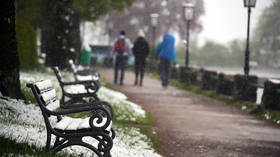Hit by heat: Extreme measures needed to tackle climate chaos before it’s too late
While some politicians move to address the cascading and unequal effects of climate change in the US, two direct action endeavors show the power and need for more pointed efforts outside the legislative sphere.
The last week in July saw record-breaking temperatures across the globe. The forecast map for Europe appeared as a giant oppressive red mass with barely any orange or yellow nuance. Not built to withstand temperatures in the triple digits fahrenheit, cities such as Stockholm, Paris, Berlin, and elsewhere boiled beneath an unrelenting summer sun.
Here in the US, cities across the country sent out advisories telling residents to stay inside with air conditioning on. And while three-quarters of homes in the US have air conditioning, high-risk, low-income communities sometimes don’t, and even if they do, they don’t always have access to it. For instance, a mere few days after Mayor de Blasio signed an executive order declaring a state of emergency due to extreme temperatures, nearly 50,000 Con Edison customers had their power cut. The company cited necessary repairs and the need to protect its equipment but failed to comment on the fact that their cut targeted neighborhoods that both ranked 4 out of 5 on the heat vulnerability index and are predominantly communities of color.
Here in the great corporatocracy that is the US, it’s not unusual for companies to brush off gross wrongdoings, particularly when it mostly impacts poor, disabled, black, and brown communities.
As the effects of climate change become more and more pronounced, the corruption and systemic bigotry of the US political system will only become more obvious and tangible. Of course, there are ways to address this.
Just before the August recess, Senator Kamala Harris and Representative Alexandria Ocasio-Cortez introduced the Climate Equity Act, a bill that would require a special congressional review of legislation through the lens of so-called frontline communities.
In a broad sense, frontline communities are those who experience disproportionately acute effects of both climate and economic policy. This includes black, brown, indigenous, disabled, LGBTQ2S, and other violently marginalized folks. It includes those who suffer most from pollution and environmental destruction and who find their neighborhoods marked as primary sacrifice zones for new dirty energy and industrial projects.
By connecting such frontline communities to the issue of climate justice, this bill highlights an important intersection between climate chaos, income inequality, and race in the US. That being said, it is important to not place too much hope or trust in the legislative path to climate justice. Both because of the inherently slow legislative process and the deep-rooted corruption of our system, direct action must be the primary focus of mitigating climate chaos.
For instance, roughly 200 miles north of San Francisco, California, in the Mattole River watershed, a battle to protect some of the last old growth forests in the region is intensifying.
Since early June, a tree-sitter has been living in an old growth Douglas fir on Rainbow Ridge, a key logging area, attaching lines to neighboring trees to stop them from being felled by the Humboldt Redwood Company (HRC).
"Forest defenders report on continuing actions to defend the ancient Mattole forest. Recently, the Humboldt Redwood Company has attempted to forcefully remove a tree sitter." https://t.co/oXumohZqDQ#savethemattole
— Diablo Rising Tide (@RTBayArea) June 17, 2019
Meanwhile, solidarity actions on the ground have blocked logging vehicles and workers while exposing the hypocrisy of HRC, a company that claims their industrial logging is “sustainable.” In reality, HRC not only logs old growth trees, a practice they claim to avoid due to sustainability reasons, but also practices a method of forestry known as hack-and-squirt. This refers to hacking around the base of an undesirable tree and then spraying pesticides into the opening.
The goal is to get rid of trees that aren’t economically viable and make room for tree farms that consist of tightly-packed rows of, typically, one type of tree. This practice is not only unsustainable, it decimates complex ecosystems through the use of pesticides and the construction of monoculture greenery that can not sustain diverse plant and animal life.
Meanwhile, the dead or dying tree carcasses left in the wake of hack-and-squirt operations provide astonishingly dangerous kindling for wildfires in a state that has experienced two straight years of record-breaking forest fires. Indeed, apart from providing buffers against wildfires, natural and old growth forests act as heat sinks for extreme temperatures, clean the air, and provide us with that most precious and mistreated element, oxygen. In other words, the direct action work of blocking logging access and protecting these trees in the Mattole is vital. It is immediate, resolute and side-steps the pandering between industry and government.
Similarly, in the Appalachian Mountains of Virginia, the group Appalachians Against Pipelines are employing direct action tactics to stop construction of the Mountain Valley Pipeline, a proposed 303-mile fracked gas pipeline that would run from Northwestern West Virginia to Southern Virginia. The project would produce the equivalent of 26-coal fired power plants in terms of greenhouse gas emissions. As noted in their mission statement, “After years of organizing to stop the MVP, in February of 2018 as tree clearing began, people were left with no choice but to take to the trees to defend Peters Mountain and the Jefferson National Forest.”
In late July, as protectors marked day 319 of the tree-sit, over 30 people blocked work at a site in Cove Hollow. Close to the tree-sit, three protectors were arbitrarily and violently arrested. This kind of aggressive pushback from law enforcement and dirty energy security (who are often one and the same) is common at every front line and direct action effort. Incidentally, this proves the efficacy of the tactic.
3 people just arrested at Yellow Finch tree sits, all without warning. At least 2 of them were tackled. Tree sits still standing strong — today is day 319. Help us fight this pipeline & this state repression: https://t.co/BeILeCrRnF#nomvp#nopipelines#resist#acabpic.twitter.com/7rYEqh8HCH
— Appalachians Against Pipelines (@stopthemvp) July 20, 2019
As of now, trees marked for destruction in the Mattole and along the path of the Mountain Valley Pipeline are still standing. Every day they stand is a small victory for people and planet.
Ultimately, we can not sit back and hope that our politicians will act correctly or quickly enough to tackle the climate chaos that we are already experiencing. We simply don’t have that luxury of time. Legislation regarding climate justice should be simple: if it’s a dirty energy project, the answer is ‘no.’ If it’s pointlessly destructive, particularly regarding fragile ecosystems and necessary barriers to climate chaos and deforestation, the answer is ‘no.’ If it puts lives at risk for the sake of corporate profit in a dying environment, the answer is always ‘no.’ Unfortunately, the bill put forward by Ocasio-Cortez and Harris does not have this kind of streamlined urgency.
It might sound like an extreme stance to take, but having experienced the heatwaves in both Europe and the US this summer, I can say that the only extremism we need to worry about is the extreme danger of doing too little, too late.
Endeavors like those happening in Northern California and Virginia are but two examples of the global efforts to slash emissions, restructure our energy economy, and build climate justice in the midst of climate chaos. Through solidarity, diversity of tactics, and pointed resolve, we can use events like the recent oppressive heatwaves in both Europe and the US as jumping-off points for collaborative work, rather than apathetic despair.
By Eleanor Goldfield
Eleanor Goldfield is a creative activist and journalist. She is the producer and host of the show, Act Out! on Free Speech TV as well as co-host of the podcast Common Censored with Lee Camp.
ArtKillingApathy.com @ActivistEleanor
Think your friends would be interested? Share this story!
The statements, views and opinions expressed in this column are solely those of the author and do not necessarily represent those of RT.














